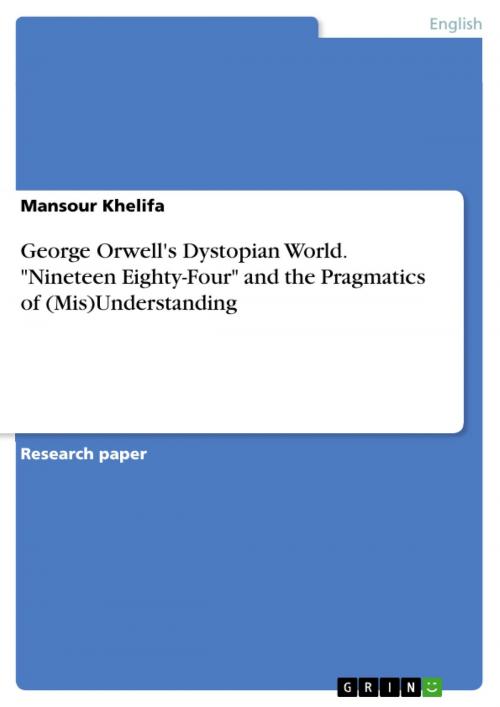George Orwell's Dystopian World. 'Nineteen Eighty-Four' and the Pragmatics of (Mis)Understanding
Fiction & Literature, Literary Theory & Criticism, British| Author: | Mansour Khelifa | ISBN: | 9783668132306 |
| Publisher: | GRIN Verlag | Publication: | January 25, 2016 |
| Imprint: | GRIN Verlag | Language: | English |
| Author: | Mansour Khelifa |
| ISBN: | 9783668132306 |
| Publisher: | GRIN Verlag |
| Publication: | January 25, 2016 |
| Imprint: | GRIN Verlag |
| Language: | English |
Research Paper (undergraduate) from the year 2015 in the subject English Language and Literature Studies - Literature, , language: English, abstract: Occupying a central position in the political inner debate of Winston Smith, the main character in Orwell's novel Nineteen Eighty-Four, is the following statement/promise/threat: 'We shall meet in the place where there is no darkness' (25). This cryptic illocutionary speech act is initially heard by Winston in a dream, then is distinctly associated with, and equivocally reiterated, later on in the novel, by O'Brien who embodies, at the same time, the main character's ideological mentor, intellectual tormentor and physical torturer. As the story unfolds, the initially promising trope, 'the place where there is no darkness,' becomes more and more of a sibylline utterance representing a locus of (mis)understanding and a space of radical misreading. The representation of this place is stripped of its dream-like, metaphorical significance and reveals a dark, deictic and literal meaning. '[T]he place where there is no darkness' turns out the infamous Room 101, which is precisely the opposite of what it initially passes for, that is, a 'utopian' space of enlightenment. On the contrary, Room 101 is a 'dystopian' place, in the novel, where the light is deliberately never switched off as a torture inflicted upon political dissidents like Winston Smith. Likewise, the story line seems to operate a series of ironical degradations such as utopia becoming dystopia; metaphor dwindling into synecdoche; and euphemism signalling a glaring 'statement' (25) charged with a sense of utter (mis)understanding, foreboding and warning, culminating in the irreversible destruction of the main character. Winston's revolutionary dream of a better world turns into a horrible nightmare full of equivocation and despair. The mutual (mis)understanding between Winston and O'Brien leads to complete brainwash and emasculation of the former. Winston's political resistance to, and hate of, Big Brother's regime are annihilated, his dream is shattered. The story ends with Winston being ultimately defeated, ironically depicted as follows: '[h]e had won the victory over himself. He loved Big Brother' (297); whereas at the beginning of the narrative he has emphatically written in his secret diary in distinct capital letters: 'DOWN WITH BIG BROTHER' (18).
Research Paper (undergraduate) from the year 2015 in the subject English Language and Literature Studies - Literature, , language: English, abstract: Occupying a central position in the political inner debate of Winston Smith, the main character in Orwell's novel Nineteen Eighty-Four, is the following statement/promise/threat: 'We shall meet in the place where there is no darkness' (25). This cryptic illocutionary speech act is initially heard by Winston in a dream, then is distinctly associated with, and equivocally reiterated, later on in the novel, by O'Brien who embodies, at the same time, the main character's ideological mentor, intellectual tormentor and physical torturer. As the story unfolds, the initially promising trope, 'the place where there is no darkness,' becomes more and more of a sibylline utterance representing a locus of (mis)understanding and a space of radical misreading. The representation of this place is stripped of its dream-like, metaphorical significance and reveals a dark, deictic and literal meaning. '[T]he place where there is no darkness' turns out the infamous Room 101, which is precisely the opposite of what it initially passes for, that is, a 'utopian' space of enlightenment. On the contrary, Room 101 is a 'dystopian' place, in the novel, where the light is deliberately never switched off as a torture inflicted upon political dissidents like Winston Smith. Likewise, the story line seems to operate a series of ironical degradations such as utopia becoming dystopia; metaphor dwindling into synecdoche; and euphemism signalling a glaring 'statement' (25) charged with a sense of utter (mis)understanding, foreboding and warning, culminating in the irreversible destruction of the main character. Winston's revolutionary dream of a better world turns into a horrible nightmare full of equivocation and despair. The mutual (mis)understanding between Winston and O'Brien leads to complete brainwash and emasculation of the former. Winston's political resistance to, and hate of, Big Brother's regime are annihilated, his dream is shattered. The story ends with Winston being ultimately defeated, ironically depicted as follows: '[h]e had won the victory over himself. He loved Big Brother' (297); whereas at the beginning of the narrative he has emphatically written in his secret diary in distinct capital letters: 'DOWN WITH BIG BROTHER' (18).















